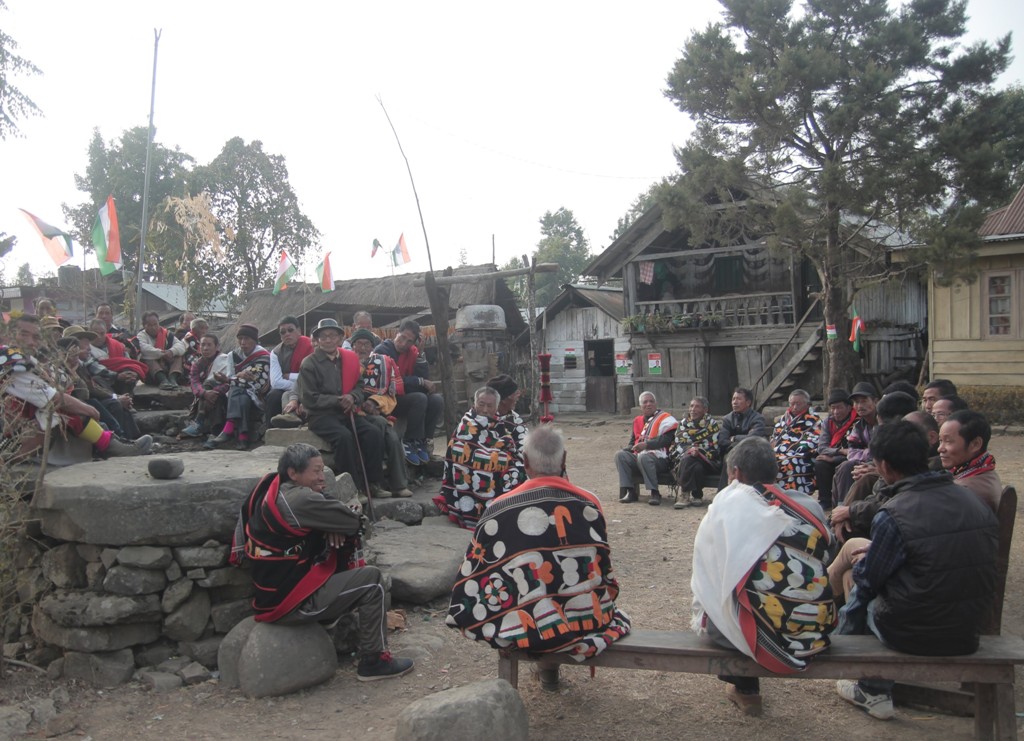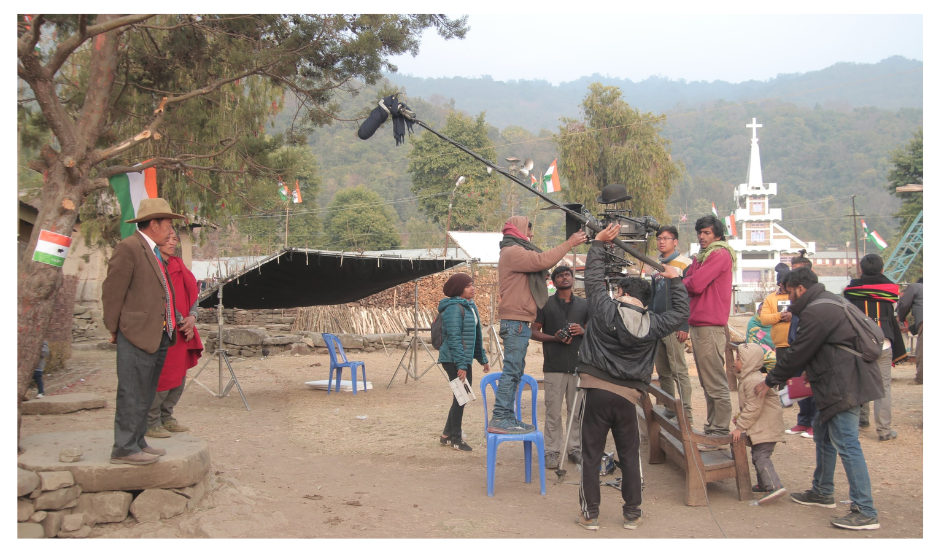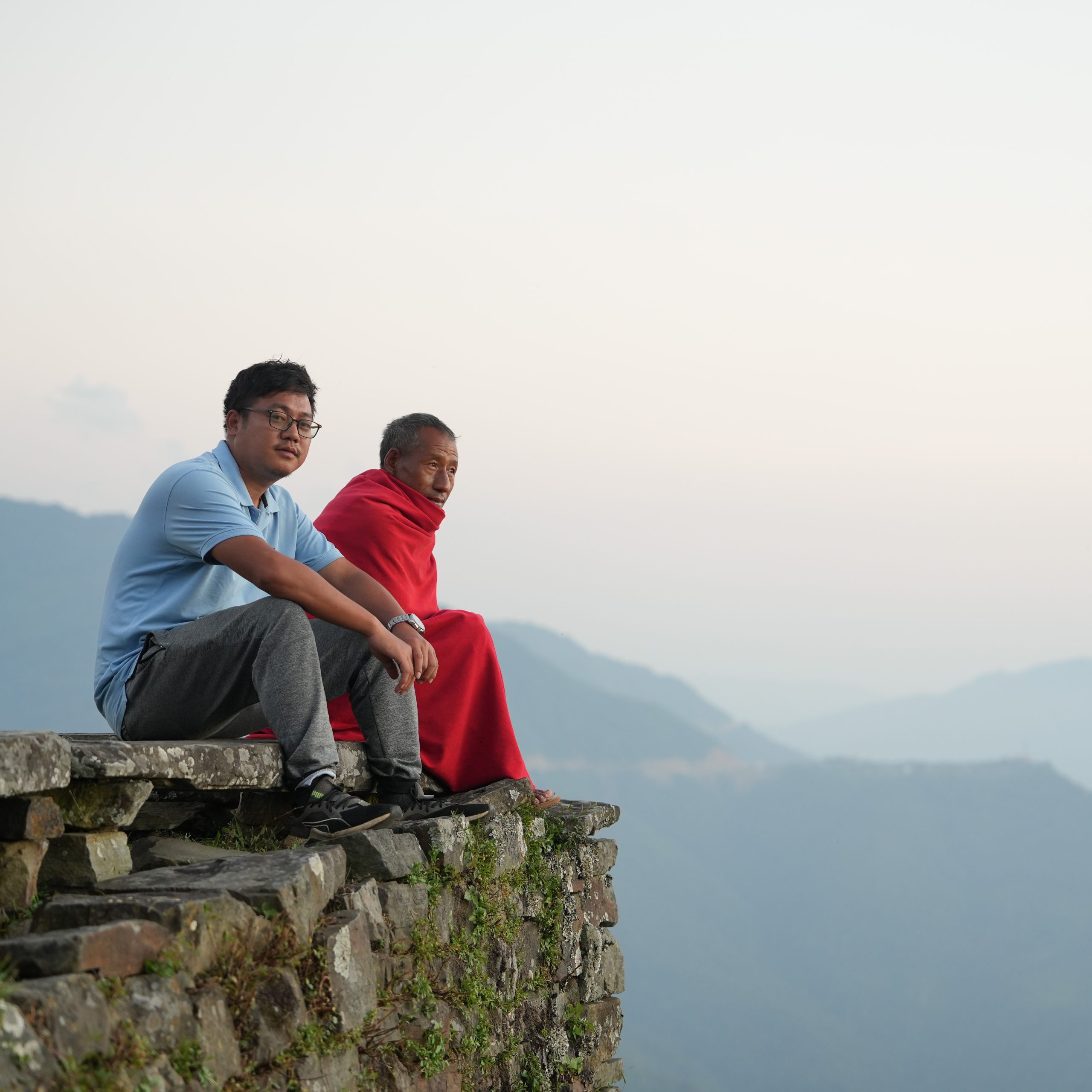WEDNESDAY, APRIL 16, 2025
- Home
- Real and reel life: What it takes to become a filmmaker
Real and reel life: What it takes to become a filmmaker
Published on Aug 21, 2024
Share

DIMAPUR — After completing Class 12, Ashok Veilou enrolled for a course in law on suggestion from a relative but discontinued after two years. He then switched to Mass Communication (St. Anthony’s College, Shillong) but still struggled to envision his future career. It was only when he joined the Satyajit Ray Film & Television Institute (SRFTI), Kolkata for a postgraduate degree in Direction & Screenplay Writing that his perspective began to shift. The extensive hours spent watching films, engaging in Q&A sessions, and participating in discussions reignited his passion. His observational nature, rather than a penchant for books, proved to be a valuable asset in this new path.
Veilou, an indigenous filmmaker from the Poumai Naga tribe in Manipur, is the first tribal from the state to earn a postgraduate degree in Direction & Screenplay Writing from SRFTI. His films address real stories, human rights and social issues, reflecting the lives and struggles of tribal communities. Passionate about storytelling, he is committed to sharing the unique narratives of his people and culture through cinema.
In an interview with Eastern Mirror, the 33-year-old filmmaker behind ‘Tou-Tai (Seed)’ and ‘Look at the Sky’ shares an outline on filmmaking as a course and its scope.
What types of courses are available for students to apply for?
Film institutes in India offer courses such as Direction and Screenplay Writing, Cinematography, Editing, Sound Design, Production Design, Acting, and Animation/Visual Effects (VFX). Each role uniquely contributes to filmmaking: Directors are the visionaries guiding the project’s overall direction, while producers manage the production, keeping everything on track. Screenwriters craft the narrative, laying the story's foundation. Directors of Photography (DOPs) capture the visuals, shaping the film's visual language. Editors refine the narrative in the final cut, and sound designers create the auditory atmosphere, enhancing emotional impact. Actors bring characters to life, production designers build the film's world, and Animation/VFX enhances storytelling.
To determine if a course aligns with your interests and goals, assess what excites you most, review the curriculum, ensure it supports your career aspirations, and seek advice from professionals or alumni.
Given the limited number of seats in film and television institutes, what qualities or attributes do students need to stand out in their applications?
To stand out in the highly competitive selection process of the two premier national film institutes, namely the Film and Television Institute of India (FTII), Pune, and the Satyajit Ray Film and Television Institute (SRFTI), Kolkata, where only 10 students are selected per department and two seats are reserved for foreign students at each institute, applicants must demonstrate strong creativity, a deep passion for storytelling, and a unique artistic vision. Practical experience, such as a background in mass communication, is advantageous. Joining a film appreciation course is a great way to enhance one's understanding. Watching a diverse range of films can help articulate one's own directorial approach, expose them to broader perspectives, and sharpen critical thinking. Applicants should be well-rounded and grounded, possessing originality and authenticity. For more information, applicants can visit the websites www.ftii.ac.in and www.srfti.ac.in, which provide detailed information on the application process, course offerings, and other essential details.

In brief, what can students expect when they enrol in film and television institutes?
When students enroll in film and television institutes like the Film and Television Institute of India (FTII), Pune, or the Satyajit Ray Film and Television Institute (SRFTI), Kolkata, they can expect a transformative experience. These prestigious institutes offer the chance to explore a diverse range of global cinema, which enhances their understanding of the art and craft of filmmaking. Daily exposure to world-class films undoubtedly broadens perspectives and deepens storytelling skills. Film schools also foster an environment where students can learn, unlearn, and relearn about humanity and universality through the works of great auteurs. Students also benefit from access to advanced technology and have the opportunity to meet and network with working professionals in the field.
Can you share your perspective on students who choose to be self-taught rather than enrolling in such institutes?
Choosing to be self-taught in filmmaking is one good approach to filmmaking. However, from my experience, growing up in a village with no exposure to cinema left me with minimal film knowledge. Formal film education awakened my dormant creative senses, enabling me to craft and sculpt my narrative. Without exposure to film education, my perspective and talent would be limited and left unexplored. Filmmaking has its own language, which is crucial for creating compelling films. Therefore, I recommend attending film school to build a strong foundation and develop the skill sets needed to reach wider platforms.
What does the journey of a filmmaker from Northeast India typically look like, especially given the challenges related to limited opportunities?
Filmmakers in the Northeast face challenges such as limited infrastructure and funding, which hinder film production. However, opportunities and advancements in technology have made filmmaking more accessible today. Some filmmakers from the Northeast are finding global recognition by successfully creating and sharing their own authentic stories.
Reflecting on your own career journey, what key insights should students consider as they begin their filmmaking careers after graduation?
As you begin your filmmaking career, remember that every story is unique and powerful. Also, filmmaking is a collaborative art, so it is important to develop strong teamwork and communication skills. Embrace feedback and criticism as tools for growth. Stay true to your vision while remaining open to learning from others. Understand industry trends and opportunities, and continually seek self-improvement. Be original, and dream big.

How have the skills you gained from direction and screenplay writing influenced your current professional practices?
As a Direction and Screenplay writer, my responsibilities span all stages of filmmaking. In pre-production, I do research, write the story, craft the screenplay, develop characters, and understand the film’s visual style. As a director, I plan shots, cast actors, and coordinate with various departments. During production, I guide actors’ performances and oversee filming to ensure my vision. In post-production, I work with editors to shape the final cut and enhance the film. Together with my sound designer and music composer, we try to breathe life into the film.
My professional practices in filmmaking are shaped by the limitations and availability of resources. I have learned to handle the challenges of working with non-professional actors, and choose to cast actors who have lived through similar experiences to bring authenticity to my stories.
I spend maximum quality time in absorbing and observing the ambience before the principal photography. I love to unveil the uncomfortable, unspoken, unpleasant, untouchable, undoable aspects of people. The words of my villagers, “If I am in your camera, I will live forever,” inspire me to give voice to their stories and truths.

RAPID INSIGHTS
A film that everyone must watch before they die
Tokyo Story (1953) - directed by Yasujirō Ozu
The best scene directed by you
I wouldn’t single out one scene as the best because I consider every scene as equally crucial to the story. However, the blessings of my grandparents hold a unique significance for me. I carry their blessings with me—to climb many mountains and cross many rivers. I incorporate these blessings into my films, such as ‘Tou-Tai (Seed)’ and ‘Look at the Sky’, as a personal tribute to the deep connection I have with my grandparents. As a child, I would visit them and receive their heartfelt blessings, where they would touch my head and wish me strength and success.
Your interests outside of filmmaking
I enjoy observing the spontaneity of people and nature in solitude.
Veilou’s notable filmography and awards:
- Directed and written the short film ‘Tou-Tai’ (Seed), 2016
- Winner of the Golden Royal Tiger Award for the best Short Film – Kolkata International Film Festival (KIFF) - 2016
- Jury Mention Award at Bodhisattva International Film Festival - 2016
- Directed and written the short film ‘Look at the Sky’ 2018
Winner:
- Golden Royal Tiger Award for the best short film – Kolkata International Film Festival (KIFF) 2018
- Best short film at International Documentary and Short Film Festival of Kerala (IDSFFK) 2019
- Best Indian Student Short at Tamil Nadu Festival 2020
- Best Northeast Film at Chalachitram National Film Festival , 2020
- Best Production Designer and Second best film at International Short Film Festival 2022
- Indian Focus at Poitiers Film Festival, France 2019
- Official selection as one of the best 10 films from Manipur, to showcase the Golden Jubilee of Manipuri Cinema at the 53rd International Film Festival of India (IFFI), 2022
Honours:
- Represented India as part of the Indian delegate in the 76th Festival de Cannes 2023
- Recipient of the Young Tribal Achiever Award conferred by the Government of Manipur in 2022
- Recipient of the Award of Excellence 2019, Fransalian Youth Mission, Northeast India Province

